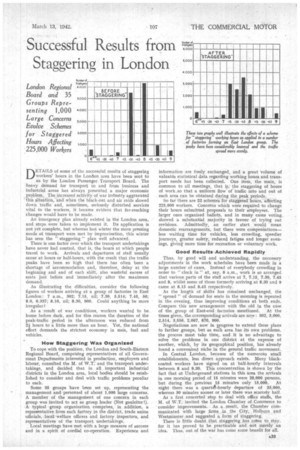Successful Results from Staggering in London
Page 35

If you've noticed an error in this article please click here to report it so we can fix it.
DETAILS of some of the successful results of staggering workers' hours in the London area have been sent to us by the London Passenger. Transport Board. The heavy demand for transport to and from business and industrial area has always presented a major economic problem. The increased activity of war industry aggravated this situation, and when the black-out and air raids slowed down traffic and, sometimes, seriously disturbed services vital to the workers, it became evident that far-reaching changes would have to he made.
An 'emergency plan already existed in the London area, and steps. were taken to implement it. Its application is not yet complete, but whereas last winter the more pressing needs ol transport were met by improvisation, this winter has seen the " staggering " plan well advanced.
There is one factor over which the transport undertakings have never had control, that is, the hours at which people travel to work. Arrivals and departures of staff usually occur at hours or half-hours, with the result that the traffic peaks have been so high that there has often been a shortage of accommodation and, therefore, delay at the beginning and end of each shift, also wasteful excess of seats just before and immediately after the maximum demand.
As illustrating the difficulties, consider the following figures of workers arriving at a group of factories in East London: 7 a.m., 302; 7.15, nil; 7.30, 5,514; 7.45, 56; 8.0, 6.337; 8.10, nil; 8.30, 000. Could anything be more irregular?
As a result of war conditions, workers wanted to be home before dark, and for this reason the duration of the peak-traffic period in the afternoon was reduced from 21 hours to a little more than an hour. Yet, the national effort demands the strictest economy in men, fuel and vehicles.
How Staggering Was Organized To cope with the position, the London and South-Eastern Regional Board, comprising representatives of all Government Departments interested in production, employers and labour, consulted the M. of WI'. and the transport undertakings, and decided that in all important industrial districts in the London area, local bodies should be established to consider and deal with traffic problems peculiar to each.
Some 35 groups have been set up, representing the management and personnel of about 1,000 large concerns. A member of the management of one concern in each group was invited to act as group leader (Not gauleiter!). A typical group organization. comprises, in .addition, a representative from each factory in the district, trade union local: welfare officers and factory inspectors, and representatives of the transport undertakings.
Local meetings have met with .a large measure of success and in a spirit of cordial co-operation. Experience and
information are freely exchanged, and a great volume of valuable statistical data regarding working hours and transport needs has been collected. One item, the main, is common to all meetings, that is; the staggering of hours of work so that a uniform flow of' traffic into and out of each area can be obtained during the peak periods.
So far there are 22 schemes for Staggered hciurs, affecting 225,000 workers. Concerns which were required to change their hours submitted proposals to their employees. The larger ones organized ballots, and in many cases voting. showed a substantial majority in favour of trying out revisions. Admittedly, an earlier start would mean domestic rearrangements, but there were compensations— less waiting time for vehicles, less crowding, speedier journeys, greater safety, reduced fatigue and longer evenings, giving more time far recreation or voluntary work.
Good Results-Achieved Rapidly
Thus, by good will and understanding, the necessary adjustments in the work schedules have been made in a large number of cases. Instead of everybody crowding in order to " clock in" at, say, 8 a.m., work is so arranged that various parts of the staff arrive at 7, 7.15, 7.30, 7.45 and 8, whilst some of those formerly arriving at 8.30 and 9 came at 8.15 and 8,45 respectively.
As the length of shifts has remained unchanged, the " spread" of demand for seats in the morning is repeated in the evening, thus improving conditions at both ends. Compare this new arrangement with the old in the case of the group of East-end factories mentioned. At the times given, the corresponding arrivals are now: 302, 3,000, 2,514, 3,556, 2,067, 870, 900.
Negotiations are now in progress to extend these plans to further groups, but as each area has its own problems, the process must take time, and it is no advantage to solve the problems in one district at the expense of another, which, by its geographical position, has already found a convenient niche in the general traffic movement.
In Central London, because of the numerous small establishments, less direct approach exists. Many blackcoated workers have signed on at half-hourly intervals between 8 and 9.30. This concentration is shown by the fact that at Underground stations in this area the arrivals in one morning period .of 15 minutes were 26,000 persons, but during the previous 15 minutes only 15,000. At night there was a quartek-hourly departure of 35,000, whereas 30 minutes sooner or later there was scarcely half.
As 'a first concerted step to deal with office staffs, the M, of W.T. invited the London Chamber of Commerce to consider improvements. As a result, the Chamber communicated with large Erms,,in the City, Holborn and Westminster ;and suggested a. form of staggering. .
There is little doubt that staggering has conie to stay, for it has proved to be practicable and not merely 'an idea. Thus, out of the war has come some benefit for all.




















































